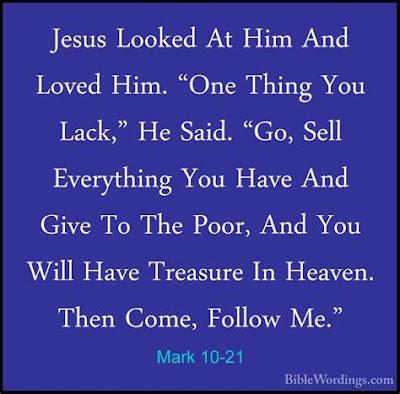[Note to congregation on why I hand out the text. I would love you to take it home with you. To reread it, to think it through for yourself. Possibly to learn a verse. To live with it. To let it become part of you. And the purpose of this talk is not to entertain, or to give you a solid interpretation of the passage (I couldn't possibly do that, and I cannot claim to begin to have understood it), but to give you a fascination for the passage – and a desire to look at it again on your own or maybe with others. If that happens, then this talk has done it's work].

A man comes to Jesus. He seems to have everything
He is young (Luke): life is ahead of him
He is a ruler (Matthew) and so has influence and power
He is morally upright: he has kept the commandments
He has wealth, and all that it offers: openings, security,
comfort and status
But he is not satisfied.
He knows that something is missing, there is something more.
He asks, “What must I do to inherit eternal life”
[the passage uses several words to describe what he is
longing for: eternal life, the kingdom of heaven, heaven, salvation]
And it is a question that is bugging him. Notice that he runs to Jesus.
And Jesus replies to him: “You have everything, but you lack
one thing – treasure in heaven”. And then comes the bombshell. “Sell what you
own, and give the money to the poor, then come follow me”.
Luke’s version of this story makes it clear that Jesus
is telling him to “Sell everything that you have”.
I have heard many talks, and I have given talks, which spend most of the time explaining why what Jesus said to this rich man does not apply to me or you!
But I am not sure that that is right.
Of course it is not a general command that everyone who is a Christian, a follower of Jesus, should sell everything and give to the poor.
Clearly in the New Testament people became Christians and held on to private property.
So, for example, in Acts 5, Ananias and Sapphira are condemned not because they sold a field and kept back some of the proceeds for themselves. Peter says, “While it remained unsold, did it not remain your own? And after it was sold, were not the proceeds at your disposal? “ They are condemned for lying to the Church, for saying that they had given everything, when in fact they had kept back a portion for themselves.
Or take Lydia, who is described as a trader in purple cloth – in luxury goods. When she becomes a Christian she is not told to sell everything.
Even those who became Christians who had slaves are not told that they have to set their slaves free – although as the gospel grows in their hearts so they should begin to see that they cannot treat another person as property but as a brother or sister.
And Paul writes that Christian believers have a responsibility to look after the members of their own family, especially when those members are in need. You can only do that if you have means.
So, no. If you want to get to heaven, you do not have to first sell everything that you have. This is not a general universal command.
Jesus tells us what they are in these verses
- Put God first (no one is good but God alone)
- Do not murder (and destroy the image of God that
is another); do not commit adultery (and break the heart of marriage and the
family); do not steal (which implies that we live in a world where there is personal
property), bear false witness (break trust), defraud (it is interesting that
the command in the 10 commandments is actually ‘do not covet’; it is the only one
of the ten commandments which openly forbids a desire); honor your father and
mother (show respect for those who have gone before).
But sell what you have is not in the 10 commandments. It is not a general law.
But that does not mean that it does not apply to you or me.
Many have heard Jesus words and taken them seriously.
There are those who are well-known.
Anthony of Egypt who left a privileged background to go to live as a hermit in the Egyptian desert. He is often considered to be the first of the desert fathers and mothers. St Francis of Assisi, Hudson Taylor, CT Studd, Mother Theresa (she died in the same week as Princess Diana. Diana left £30m. Theresa left a bucket and two saris.)
Or there is someone like John Laing, the owner of the construction company. He was a committed Christian, a member of the Plymouth Brethren. He introduced paid holiday, a minimum working week of 24 hours for workers on zero hour contract (or the equivalent) and some pension, all ground breaking initiatives at the time. In 1922 he sold 40% of his stock to set up a charitable trust, and he gave away over £500m. And when he died in 1978 his personal wealth was less than £400.
But there are also the many unknown women and men who have heard this word of Jesus, given away everything and followed him.
Countless numbers who have joined some kind of monastic community, and taken vows of obedience, poverty and chastity.
Or others. I think of one couple who became Christians, heard this word, sold their house, gave up their jobs, and went on the proceeds to Nepal as missionaries. That didn’t work out, so they went to Ukriane where they set up a home caring for teenage girl orphans. They came to work with us in Moscow and Josh is now a vicar.
For the rich young ruler, however, this word is too radical, too shocking. It shakes his whole world.
He had a desire for that other world, but he could not let go of the things of this world.
He was like the monkey who had put his fist into a jar of peanuts and grabbed them and couldn’t draw his fist out (that, I am told is one way to catch a monkey!) and so was trapped. His only way to freedom was to let go of the peanuts.
He had been blinded by his wealth
He was like Gollum and his precious, the ring of power, in Lord of the Rings
He could not see further than his wealth and what it bought
him. He could not see that:
- His wealth had become his God. It was what he lived for. He thought that he possessed his wealth, but his wealth possessed him
- If he was really serious about God and the things of God, he was to live not for this world, and the things of this world, but for the things of that world. He was not to build up treasure here, but treasure there.
- He was loved by Jesus. I’m sure you noticed that verse. It is very striking. “Jesus, looking at him, loved him”. That really is all we need. That we are seen by Jesus, known by Jesus and loved by Jesus.
- He was in danger of missing out on so much. Jesus is inviting him to begin a new life. To become one of his disciples. A life not as a wandering beggar, but a life in community. It was not an easy life. It would lead to the cross. In verse 17, the Greek states that ‘Jesus set out on his way’ – that is important because ‘the way’ in Mark’s gospel is ‘the way’ to the cross and ‘the way’ of being a follower of Jesus. It was to be a life lived in dependence on God, like the ‘little children’ of the previous verses. But it was also a life which is certainly exciting, constantly asking new things of us, enabling us to change, and that leads through the cross to the resurrection and heaven.
Jesus is the pearl of great price, the treasure hidden in
the field. It is worth giving up everything else for him.
And Jesus is saying to him: your money is stopping you from
following me, so get rid of it and then you will be able to come and follow me.
Most of us are like this young ruler.
We have been blinded by our material wealth to God, to the love
of Jesus, to the call of Jesus.
We cannot let it go.
We may not be like Gollum, but we are like Frodo. Frodo, in the end, as he stands over the furnace that is mount Doom about to drop in the ring and destroy it, could not let it go.
But then grace came in. Frodo had had pity on Gollum and had not killed him. And now it is Gollum who bites off Frodo’s finger with the ring on it, and then falls with the ring into the fire.
And perhaps if we are blinded to the love of Jesus, or to the life that he offers us, by our wealth – then maybe we could ask God, in his mercy, to use circumstances to set us free from the love of money.
Giving, by the way, is one of those ways that we are set free, and one of the ways that we express our freedom. Give till it hurts and then give more. That is when you know that God is doing his work!
But God will use other things: an investment that crashes (we know about that), a collapse in the housing market, redundancy or theft, a pension fund that goes belly up, or maybe someone in the family has a completely unexpected and very expensive need or opportunity.
[Story of the non-possessors, followers of St Nilus of Sora, whose monasteries were taken from them]
And that which we held on to, like the peanuts which our monkey with its hand in the jar was holding on to, is lost.
But after the pain and the angst, we discover that we are free. We can see more clearly. We are thrown back in dependence on God; we receive the love that Jesus has for us, the power of Jesus to do what is impossible, and we look for a future world.
I wonder what became of this man. He goes away sad now.
But I wonder and I hope.
Maybe his money was taken from him by an act of God! And he
had no option but to turn to Jesus.
Or maybe, as he grew older and – possibly - richer, by the
grace of God the dissatisfaction with the things of this world and the longing
for the things of that world grew.
And he began to try out Jesus’ words – to let it go, and to follow him.

